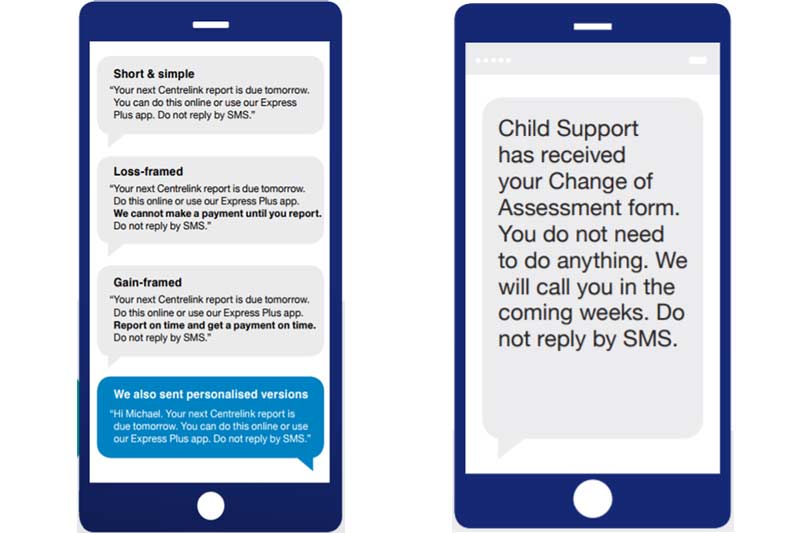
The Australian Government’s central unit for
behavioural economics in public policy, the Behavioural Economics Team (BETA), has
released
two reports on the effective use of SMS for improving interactions between
citizens and the Government.
In the ‘Timely
Reminders to Report on Time’ study, BETA partnered with the Australian
Government Department of Human Services (DHS) to trial whether providing
targeted, timely and behaviourally informed prompts about reporting income, via
SMS, improves the number of recipients who report on time.
For Australians looking for work, Newstart Allowance and
Youth Allowance (other) are the main payments provided by the Australian
Government. In 2016, these payments totalled AU$10.95 billion. People who
receive these payments must report their income every fortnight to ensure they
receive the correct payment. In any given fortnight over 80,000 people (or 9
per cent) are late reporting their income and approximately 3,100 people are so
late their payments are cancelled.
There are three common biases which influence late
reporting: Cognitive overload (a person is overwhelmed with the amount or
context of information provided to them); Procrastination (people are
short-sighted and often put off decisions or behaviours, even those in their
best interests); and Optimism bias and overconfidence (tendency to be
unrealistically optimistic, leading to people being overconfident about their
ability to report on time).
Drawing on these behavioural insights, BETA designed three
types of SMS reminders sent the day before the income report was due: a short
and simple reminder (short group); a reminder emphasising the costs of not
reporting (loss frame); and a reminder making the benefits of reporting on time
more salient (gain frame). Each message was sent in two versions: a
personalised and a non-personalised version.
The ‘Loss Aversion’ type read “Your next Centrelink report is due tomorrow. Do this online or use our Express Plus app. We cannot make a payment until you report. Do not reply by SMS.”. The ‘Short’ type read “Your next Centrelink report is due tomorrow. You can do this online or use our Express Plus app. Do not reply by SMS”; and the ‘Gain frame’ type read “Your next Centrelink report is due tomorrow. Do this online or use our Express Plus app. Report on time to get a payment on time. Do not reply by SMS.”
BETA then tracked and measured the effect these messages had
on income reporting and then compared these results with people who did not
receive a reminder. It was found that sending any SMS reminder had a big
impact, increasing the number of people who reported on time by 13.5 percentage
points, with those who received an SMS reminder reporting sooner (66.6%) than
those who did not (53.1%).
The team also looked at how late individuals were, who didn’t
report on time. Those who did not receive an SMS reminder were, on average, 1.9
days late. Sending any SMS reminder reduced the average number of days late by
0.65 days to 1.2 days
Some reminders also resulted in fewer payment cancellations
(down by 1.7 percentage points from 3.9 per cent to 2.2 per cent).
Additionally, people who are habitually late reporters were
more responsive to SMS prompts. Habitually late reporters may simply be prone
to forgetting their reporting obligations or may face circumstances that make
it especially difficult to manage their affairs.
The team concluded that simple cost-effective SMS reminders
(the average cost of an SMS was 9 cents) can have a two-fold benefit for
Australians and the Department. The reduced likelihood of their income support
payment being delayed or cancelled is both financially and cognitively
beneficial for people. For the Department, applying the results to the full
late reporting population, could shift 10,800 more people to report on time, saving
approximately 240 hours of work every fortnight. These saved resources could be
moved to other areas of the Department. The associated reduction in contact
with the Department would also lower the burden on telephone services, making
it faster and easier for others to get through.

The second trial ‘Improving
Government Confirmation Processes’ , sent a confirmation SMS to parents who
were changing their Child Support assessment, making the whole process more
transparent.
The Child Support Scheme ensures children receive an appropriate
level of financial support following the separation of their parents. In
2016-17, the Australian Government DHS’ Child Support Agency oversaw more than
$3.5 billion worth of transfers to support approximately 1.2 million children.
Under special circumstances for parents or children, a ‘Change
of Assessment’ form has to be ldoged with the Department to adjust the amount
of child support.
Parents often follow up with a call to enquire if their form
has been received. Usually, the parent is told whether the form has arrived and
to expect to be contacted in due time. BETA partnered with DHS’ Behavioural
Insights Team and Child Support Team to simplify the process. Using behavioural
insights, BETA designed a confirmation SMS and then ran a trial to see the
response. The SMS confirmation parents received read: “Child Support has received your Change of Assessment form. You do not need to do anything. We will call you in the coming weeks. Do not reply by SMS”.
The objective was to address: Uncertainty avoidance (leads individuals
to call the Child Support area to reduce their uncertainty); Trust and
reciprocity (helps ensure positive, functional, effective relationships between
citizens and the Government); and Lack of feedback (increases uncertainty).

The confirmation SMS not only reduced the number of parents who called (down by 11.3 percentage points from 41.9 to 30.6 per cent), but if they did call, they would do so later (median time to call increased by 13 days). Based on these results, if everyone who submitted a change of assessment form received a confirmation SMS, there would be approximately 2,100 fewer phone calls made every year.
















